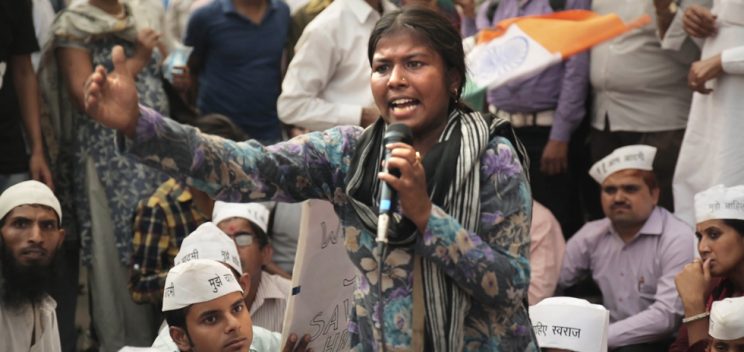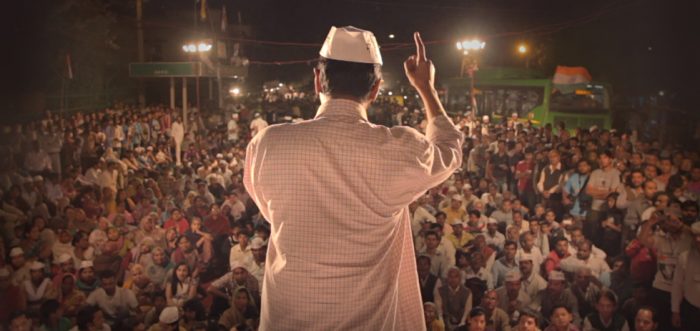![]()
Artistic representations of political realities in India have always been mired in controversy, from Mrinal Sen’s masterpiece Neel Akasher Neechey (1959) to Gulzar’s Aandhi (1975) – the lead protagonist of which was loosely based on the then Indian Prime Minister Indira Gandhi – to the more recent examples of Vishal Bhardwaj’s Haider (2014), Abhishek Chaubey’s Udta Punjab (2016) and Alankrita Shrivastava’s Lipstick Under My Burkha (2016). They all fall within a long national history of film censorship, soft targets for challenging the political and social status quo of their time. Interestingly, this phenomenon has only prompted contemporary Indian filmmakers to tell more political stories, but to do so in increasingly creative and subversive ways.
Given this context, the simple fact that a project like An Insignificant Man exists – chronicling the meteoric rise of the populist leader and current Chief Minister of Delhi Arvind Kejriwal – is in itself a cause for celebration. As expected, the documentary has run into trouble with Indian censors and it is currently unclear whether it will eventually be granted a theatrical release. Luckily, here at the Sydney Film Festival, you can watch it in its originally intended form.
Unfortunately, its very existence is where the positives end. In attempting to mount a David and Goliath narrative, tracing the origins of the political movement that ultimately gave rise to the Aam Aadmi Party (Common Man’s Party) with Kejriwal as its leader, directors Khushboo Ranka and Vinay Shukla rely almost exclusively on a broad brush narrative that provides little insight into this populist phenomenon beyond a few sensationalist newspaper headlines. The biggest issue here is that the movie is unsure of its own subject matter and where it intends to focus. Is it a character study of Arvind Kejriwal, the ‘Bernie Sanders of India’? Not really. Are there some insights about how this populist movement came to be and managed to sustain itself? Not beyond a few minutes of raw, archival footage supplemented by bold text on screen.
The directors employ a fly on the wall approach which,while it has its benefits, often subjects us to unfiltered ‘noise’. It takes careful preening to be able to weave together a sustained, coherent and engaging narrative. The narrative the directors present is eyeroll-inducing, cleaving to superficial moralism – pitting Kejriwal’s grassroots movement in one corner against the establishment political parties (Congress and the BJP) – with clearly demarcated lines of ‘good’ and ‘evil’ that have never existed before in the Indian political landscape.
And then there is the personality of Kejriwal himself. When he burst on to the political scene with his firebrand idealism, he shook not only the Indian political establishment, but also the average Indian voter who had become increasingly wary and cynical of politics in general. In a land where politics is not seen as a “respectable” profession, here was someone who seemed to put his hand up to change how things worked. And yet, fast forward to 2017 and that very idealism that once inspired people has now become the butt of WhatsApp jokes. A political movement that was forged to get a form of anti-corruption legislation passed in parliament and led to a Bollywood film being made about it ended up as nothing more than a flash-in-the-pan moment in the history of the Indian political landscape.1
There is an interesting and astute point buried somewhere in all of this about the cyclical nature of populist politics and the extent of political alienation in contemporary democratic nations. Unfortunately, the film is not at all interested in exploring these threads. It just dangles these ideas in front of the viewer without any kind of explication or coherently argued sentiment before taking them away. So, instead of any probable contextual insight that led Jha to make a Bollywood film with Kejriwal in mind, all we get is a few seconds of Kejriwal talking to the media once he comes out of the theatre. He gives the crowd a hundred-and-forty characters tweetable review.

The documentary follows the Aam Aadmi Party in their very first campaign to fight the Delhi elections against the then Chief Minister of the capital, Congress’ Sheila Dixit. While it is immediately obvious that Kejriwal is the face of this new movement, with his grand proclamations and emotionally charged rhetoric, it is also apparent that he’s not the brains behind the party. That man would be Yogendra Yadav, a politician and psephologist who had been a part of numerous grassroots political movements before coming on board the Aam Aadmi Party. In the little time we see him on screen, it is Yadav and not Kejriwal who comes across as the more interesting personality. The coming together of these two seemingly opposite personalities for a common cause had the potential to create some engaging dramatic moments – Yadav knows the political landscape like the back of his hand while Kejriwal has no political experience; Yadav believes in playing percentages and having all the ducks in a row while Kejriwal makes sweeping statements instinctively; Yadav is extremely media savvy and is media trained while Kejriwal comes across as a novice when handling the mainstream press. These dichotomies take an even greater significance in hindsight, given that Yadav was expelled from the party in 2015 for allegedly being involved in ‘anti-party activities’ and went on to launch his own political movement. But the film wastes this opportunity. After introducing these two seemingly polar opposite characters, the film doesn’t engage with their shared dynamic at all, choosing to singularly focus Kejriwal. While there is some allusion to a conflict of personalities within the party, the narrative is blinkered by its obsession with Kejriwal being projected as a messiah for the people that it leaves no room for nuance or exploring any other characters in any tangible manner. In doing so, the final product becomes a distorted hagiography.
That’s not to say that a hagiography can’t be compelling viewing. It most definitely can if the object of reverence is presented in an interesting and engaging manner. And that’s the film’s biggest stumbling block. For a film whose title is reference to Kejriwal, it is everything but him that makes for compelling viewing. The film is at its most impactful when it decides to step back from its singular focus on Kejriwal and adopts a more holistic approach – such as highlighting the attitude of the establishment parties (Congress & BJP) towards their new grassroots political rival on the scene. The carefree dismissal and incessant ridicule by the establishment – be it the political elite or the mainstream media – that drove voters to populist leaders in Europe, America and Australia, is also on display here.
India may be the largest democracy in the world but it’s been obvious for some time that the actual procedures regarding the conduct of elections is broken beyond repair. Politicians repeat slogans and avoid any substantive discussion on long-term policy. Voting blocs are aplenty, with people voting for a particular candidate on the basis of caste, creed, race and religion. Large consignments of cheap alcohol are distributed by political parties in an effort to buy last minute votes. Seeing this reality exposed for all to see is a big slap on the face of Indian democracy but the directors would rather return to the overly simplistic deification of Kejriwal.
Undoubtedly, there is a significant story buried somewhere within An Insignificant Man. The material had the potential to offer a nuanced analysis of the current Indian political landscape. Ultimately, what remains with the viewer is much like the grand, impractical promises that Arvind Kejriwal has become infamous for: a crushing sense of disappointment over unfulfilled potential.
